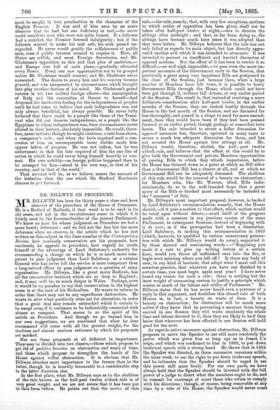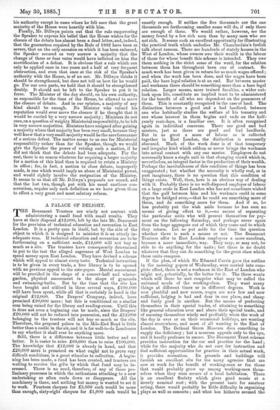MR. DILLWYN ON PROCEDURE.
MR. DILLWYN has been for thirty years a close and keen observer of the procedure of the House of Commons. He is a Radical of Radicals, if that word is to be used in its old sense, and not in the revolutionary sense in which it is falsely used by the Irreconcileables of the present Parliament. We know no man for whose judgment on Procedure we feel a more hearty deference ; and we feel not the less but the more deference when we observe, in the article which he has just written on this subject in the June number of the Contemporary Review, how anxiously conservative are his proposals, how cautiously he appeals to precedent, how eagerly he avails himself of the advantage of Lord Salisbury's authority for recommending a change on which he is as much more competent to pass judgment than Lord Salisbury, as a veteran General who has never left the service is more competent than a long-retired officer to pass judgment on a question of army organisation. Mr. Dillwyn, like a great many Radicals, has all the conservative instincts which are so deep in England ; and, it may well be, so much deeper in Wales. Perhaps, even it would be no paradox to say that conservatism in the highest sense is at the root of his Radicalism. He wants to reform in order that there may not be any superfluous destruction. He wants to alter what positively cries out for alteration, in order that a great deal may remain untouched which is certain to be swept away if it continues to be indissolubly connected with abuses so rampant. That seems to us the spirit of his article on Procedure. And though we go beyond him in our own suggestions, we are convinced that what he does recommend will come with all the greater weight, for the studious and almost anxious reticence by which his proposals are marked.
Nor are these proposals at all deficient in importance. They may be divided into two classes,—those which propose to get rid of positive bounties on obstruction and waste of time, and those which propose to strengthen the hands of the House against wilful obstruction. It is obvious that Mr. Dillwyn attaches more importance to the former than to the latter, though he is heartily favourable to a considerable step in the latter direction also.
In the first place, what Mr. Dillwyn says as to the abolition of the rule known as the half-past twelve o'clock rule is of very great weight, and we are not aware that it has been put in this form before. He points out that the motive of this rule,—the rule, namely, that, with very few exceptions, motions to which notice of opposition has been given, shall not be taken after half-past twelve at night,—was to shorten the sittings after midnight ; and that, so far from doing so, the sittings have become much later since it was adopted than they were before. Mr. Dillwyn believes that the rule has not only failed as regards its main object, but has directly aggravated another evil which it was intended to attenuate. It was intended to prevent an insufficient and hurried discussion of opposed motions. But the effect of it has been to render it so difficult,—so well-nigh impossible,—to pass even the more important measures of the Government early in the Session, that practically a great many very important Bills are postponed to the close of the Session, just because then, when a large number of Members have left town, it is possible to hurry Government Bills through the House which could not have been got through it, without full debate, at any earlier period of the Session. The result is, that instead of receiving a more deliberate consideration after half-past twelve in the earlier months of the Session, they are rushed hastily through the House in the last month of the Session, and are discussed far less thoroughly, and passed in a shape to need far more amendment, than they would have been if they had been pressed forward at an earlier period, though perhaps at somewhat later hours. The rule intended to secure a fuller discussion for opposed measures has, therefore, operated in many cases to secure a much less adequate discussion for them, and has not secured the House against late sittings at all. Mr. Dillwyn would, therefore, abolish the half past twelve o'clock rule, and believes that the effect of this would be to give both the Government and private Members opportunities of passing Bills to which they attach importance, before the House has thinned down to a point at which no Bill other than a Government Bill has a chance at all, and at which no Government Bill can be adequately discussed. The abolition of this rule would be the removal of a bounty on obstruction ; for Members who, like Mr. Warton, block Bills indiscriminately, do so in the well-founded hope that a great many of the Bills so blocked must necessarily be included in the " massacre" of July.
Mr. Dillwyn's most important proposal, however, is backed by Lord Salisbury's recommendation, namely, that the House should,—if it pass a motion to that effect, which motion would be voted upon without debate,—avail itself of the progress made with a measure in any previous session of the same Parliament, in subsequent Sessions, instead of beginning with it de 7t0270, as if the prorogation had been a dissolution. Lord Salisbury, in making this recommendation in 1869 (which, however, he qualified by various unnecessary guarantees with which Mr. Dillwyn would do away), supported it by these shrewd and convincing words :—" Supposing you made it a rule to give up writing letters at a certain hour, would you throw all unfinished ones into the fire, or begin next morning where you left off ? Is there any body of men, in any kind of business, that adopt what I must call this senseless practice, that whatever you have not finished by a certain time, you must begin again next year I I have never heard any reason for such a rule ; there is nothing but the inert weight of unmeaning custom to justify a principle which wastes so much of the labour and utility of Parliament." Mr. Dillwyn states that he has never heard even a pretence of a reply to this argument, and doubtless this absurd rule of both Houses is, in fact, a bounty on waste of time. It is a bounty on obstruction ; for obstructors will be much more active if they know that by preventing a measure from being carried in one Session they will waste absolutely the whole time and labour devoted to it, than they are likely to be if they know that whatever has been effected in one Session will hold good for the next.
As regards active measures against obstruction, Mr. Dillwyn proposes to move the Speaker to use still more resolutely the power which was given him as long ago as in James L's reign, and which was confirmed to him in 1882, to put down irrelevant speech with a strong hand. He shows that in 1604 the Speaker was directed, on three successive occasions within the same week, to use the right to put down irrelevant speech,
and he intimates that the Speaker should be urged to use this power still more freely. For our own parts, we have always held that the Speaker should be invested with the full
power of a judge to direct what the members ought to do, and to commit for contempt of court those who refuse to comply with his directions ; though, of course, being removable at any time by a vote of the House, the Speaker would never ()nub
his authority except in cases where he felt sure that the great majority of the House were heartily with him. Finally, Mr. Dillwyn points out that the rule empowering the Speaker to express his belief that the House wishes for the closure of the debate has almost been a dead letter, and, indeed, that the guarantees required by the Rule of 1882 have been so severe, that on the only occasion on which it has been enforced, the Speaker secured so very narrow a majority that the change of three or four votes would have inflicted on him the mortification of a defeat. It is obvious that a rule which can only be applied once in two years and a half of very frequent obstruction, and even that once at the risk of the Speaker's authority with the House, is of no use. Mr. Dillwyn thinks it should be strengthened, but does not tell us how far he would go. For our own parts, we hold that it should be strengthened doubly. It should not be left to the Speaker to put it in force. The Minister of the day should, on his own authority, as responsible for the time of the House, be allowed to move the closure of debate. And in our opinion, a majority of any kind should be enough. No Minister who valued his reputation would ever move the closure if he thought that it would be carried by a very narrow majority ; Ministers do not care, on a question of weighty Ministerial responsibility, to be left in very narrow majorities. Ministers have resigned after gaining a majority where that majority has been very small, because they well knew that a very small majority would be the sure forerunner of a serious defeat. The matter seems to us one for Ministerial responsibility rather than for the Speaker, though we would give the Speaker the power of vetoing such a motion, if he did not think that the debate had been adequate. For the rest, there is no reason whatever for requiring a larger majority for a motion of this kind than is required to retain a Ministry in office ; for, in fact, a motion to close debate, improperly made, is one which would imply an abuse of Ministerial power, and would rightly involve the resignation of the Ministry. It seems to us that all Mr. allwyn's proposals are sound, and that the last two, though put with his usual cautious conservatism, require only such definition as we have given them to effect a very great and most salutary reform.















































 Previous page
Previous page